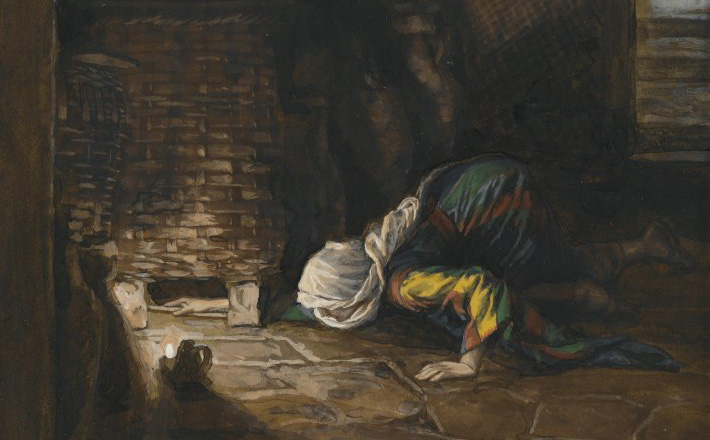Commentary on Luke 15:1-10
This particular pericope belongs to a complex of parables that is both unique to Luke and characteristic of Lukan theology.
At the end of the road, there is a meal and redemption. And nothing, nothing at all, need get in the way of the divine celebration. Perhaps what we have here is the flip side of the importance attached to conversion. If Luke 13 kept focusing on the importance of repentance and divine forbearance, Luke 15 locates that concern squarely within the divine desire for redemption — even of that which seems insignificant or unworthy.
Why unworthy? Here we look not just at the parable of the lost sheep and the parable of the lost coin, which make up the bulk of our pericope in Luke 15:3-10, but their narrated setting in 15:1-2. This Jesus who advocated for the bent-over woman in the synagogue on the Sabbath, who has been talking about table manners in 14:7-14 in the home of a Pharisee and who speaks broadly to all those who wish to follow as he travels in 14:25-33, now finds himself in truly mixed company in 15:1-10. Jesus has both tax-collectors and sinners coming to hear and Pharisees and scribes voicing their critique of Jesus’ unholy meal practice. The latter’s “grumbling” is key to understanding the underlying conflict and the purpose of these parabolic statements. New Testament scholar François Bovon argues that a text like this invites us not to be too “irritated by other people’s conversions.”1 I suspect this one hits home in an age like ours where worthiness is still disputed and someone else’s redemption is problematized. We need to be careful about the jump, since concerns about who one eats with in fact matter in the Jewish tradition. More than that, tax collectors were not just “law breakers,” but collaborators with the colonizing power of the day. The point is not to turn (Jewish) Pharisees and scribes into eternal foils for a (Christian) gospel. Again, Jesus from within the Jewish tradition tries to recast the redemption of others in a different vision of the divine purpose, which is precisely how both parables conclude in 15:7 and 10. More importantly, we need to remember as well that parables begin with the world we know and end in a world that is even now dawning upon us with metaphorical power.
The retort to the grumbling really only makes sense after the third parable in the sequence — the Prodigal Son and his elder brother — which is not included here. Structurally, however, the first two parables anticipate this by making a strong theological claim. The parables start with life as lived: a shepherd loses one of a flock of sheep; a woman loses one of her ten drachmas. What is described is not their “repentance” at all, but the absolute commitment of the person to finding them again. Action verbs predominate for the shepherd, and not the sheep: leave, go after, finds, lays it on his shoulders, rejoices, comes home, and calls together his friends. The same holds for the woman: light a lamp, sweep the house, search carefully, finds, and calls together her friends. The parallels here show that the emphasis is on the finding and the one committed to find the otherwise hapless lost sheep and passive lost coin. As a set-up for the grumbling Pharisees and scribes, the analogy is not perfect (although v. 7 with its “ninety-nine righteous”) — that insight will come through more clearly with the Prodigal Son story to follow. As a way of re-framing the concern of Jesus’ opponents, however, it leads to a stunning theological conclusion in both parables in our pericope: “there will be more joy in heaven” and “joy in the presence of the angels of God.” As near as I can tell, neither lost sheep or lost coins can really repent. But the parable reveals a divine point of view that reframes why seeking and finding matter. Joseph Fitzmyer puts it well: “repentance does not take place without the provenience and the initiative of the gracious shepherd.”2 At the same time, it is just important to remember that there is no Christian copyright (least of all in the late first century) to a notion of relentless divine seeking and finding. Amy-Jill Levine reminds us that the issue does not require some Jewish foil here: “ … as if Jews had no notion of a divinity who seeks relationship and reconciliation.”3 Preachers can make a strong theological claim here, thanks to the parables, but can do so quite well in continuity with Judaism.
The result is a much more interesting sermon, too. Repentance is not free standing. Conversion is not just for some. Underlying them all is a prevenient mercy that just keeps on searching…in the dangdest places. This does not square with the world we know, this is to be sure. But to the preacher who can read a parable metaphorically, as flashing lightening over a dark landscape, a dawning vision will occur. In heaven, the ground of repentance looks quite different. And in God’s good time that joy will break out in an illuminating flash. Preaching that attends moreover to the action verbs in the text will also benefit from noting that both parables eventuate in calling friends and neighbors together to rejoice (Luke 15:6, 9). It ends, as should any divinely-oriented parable of conversion, with a full-blown party in which the joy of heaven becomes proleptically present.
Notes:
1 François Bovon, Luke 2 (Hermeneia; Trans. D. Deer; Minneapolis: Fortress, 2013), 401.
2 Fitzmyer, Luke, 1075.
3 Amy-Jill Levine, Short Stories by Jesus: The Enigmatic Parables of a Controversial Rabbi (New York: HarperCollins, 2014), 30.


September 11, 2016